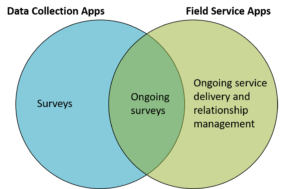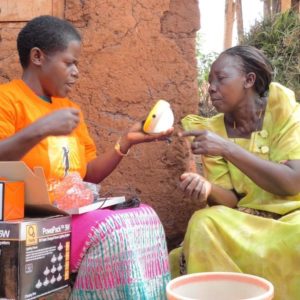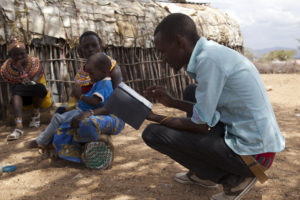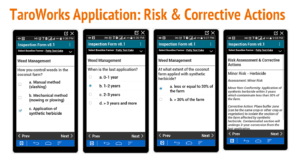
Search
Your business relies on a network of remote field agents but you also need to make data-based decisions back in the office. Your decisions are currently driven by data from logs collected on paper and transcribed into Excel months later. Now you’re thinking it’s time to switch to a digital system for speed and accuracy. Will a data collection and analysis tool fit the bill or should you consider a field service mobile app?
We talk to hundreds of organizations with field agents working in remote areas of emerging markets who confront these challenges as they’re documenting business requirements and considering a multitude of tools to help them run their operations. They’re torn between pressures to implement systems that will 1) report on metrics to investors or donors, and 2) improve their remote service delivery and provide information that will help make data-based business decisions. Each of these scenarios involve mobile tech solutions but the data is used in very different ways and for different purposes.
Types of Mobile Field Apps and Use Cases

Source: TaroWorks
For the purposes of this article, we’re addressing the scenario where you deliver services through field agents, as opposed to primarily conducting activities directly with your end-client over mobile (i.e. over SMS or IVR).
With that in mind, there are basically two types of mobile applications to consider when switching from paper to digital platforms. The first is a standard mobile data collection tool, which allows field staff to gather information through a survey on their mobile device and upload it to a central database for analysis, something often used for market research or M&E projects. The second is a system that does this data collection and analysis but will also allow an organization to manage the productivity of a remote team or accomplish other field tasks like sales, directing a supply chain or managing customer relationships. TaroWorks offers the latter – referred to as a field service mobile app – but both have a role to play depending on an organization’s needs.
In a recent TaroWorks webinar with our customer Solar Sister, a social enterprise which empowers women by helping them sell solar products, COO David O’Connor shared how their relationship management system was built to accomplish multiple goals like allowing remote business staff in Uganda, Nigeria, and Tanzania to log their recruitment of Solar Sister resellers and view their distributions of solar products to those resellers over time. The remote business staff also needed a field service mobile app that facilitated the different services they’re providing day-to-day and helped them manage their ongoing relationships with their Solar Sisters. In the process of doing so, the system captures all of their data and helps headquarters improve the business while also reporting to donors.

Image: Solar Sister demonstrating product. Source: Solar Sister
On the other hand, another organization that needs to report only on metrics to donors may only have field agents who conduct surveys but don’t need to perform any other jobs in the field. In that case, there’s only a need for data collection and no feedback loops, so a data collection tool may be more appropriate than a field service mobile app.
With so many technology systems out there, it can be confusing to choose the right one. So we’ve created a short assessment we hope will help you determine what is best for your organization.
Before taking our assessment to help choose the tool best for you, there are 2 important considerations:
Know your goals and field operations needs: Unfortunately, data doesn’t magically appear in databases; it must be collected from somebody or something. Before you decide on the right tool, you should not only understand what your organization needs to achieve, but also understand what field operations are necessary to achieve it. It may be easy to know that you need to make decisions based on data or that you need to deliver reports, but equally important is knowing exactly how that data will be logged, by whom, and as part of what processes.
Field agent responsibilities: If you have field agents, they play a crucial role as your frontline representation with your end-clients and as a source of data. The second consideration is knowing what your field agents’ responsibilities are. Are they temporary staff who are just collecting information once, or are they permanent staff who conduct multiple business processes while they’re in the field? Depending on what your field agents are tasked with, different tools can help them complete their responsibilities successfully (so you can ultimately get better data).
Once you know your organization’s goals and what your operations and processes on the ground look like, THEN it’s time to find the software and technology that can help you achieve those goals. Based on years of working with organizations deciding on tools, we’ve compiled a list of questions to consider to help you decide what kind of tool you’ll need.
Question: Do you have field agents for the sole purpose of conducting surveys or do they have other responsibilities?
If you’re only conducting one-time surveys or baseline/end line projects, a mobile data collection tool may do the trick. There are free or low cost tools that allow you to collect data offline on mobile devices such as Open Data Kit (ODK). Among other products to consider are SurveyCTO or Magpi. These tools will have different levels of analytical ability and capability to connect multiple surveys back to the same entity over time. These tools are fairly light because field agents are only entering data (data only flows one way – from the field to the database).
Answer: If your field agents need to gather data at multiple times over a longer period of time or need to maintain ongoing relationships with the people in order to assess long-term impact, a field service mobile app may be best.

Image: BOMA Project team member in Northern Kenya. Source: TaroWorks
Question: Do field agents only enter information or do they also need to access information from the central system for their work?
A field service mobile app like TaroWorks allows the field agents to access information about existing relationships they have with end-clients when they’re in the field. This could be information about relationship histories, current status on maintenance cases or even something like contact information. If field agents need to access information, ideally it’s coming from a central database that management also accesses, as opposed to a local file. In TaroWorks’ case, all data is accessed from a central Salesforce.com cloud database so all parties are seeing a single source of information simultaneously no matter where they are located.
Answer: If field agents only need to do one-time surveys and identities and histories are not important, then a mobile data collection tool might be adequate.
Question: Do field agents need to navigate many different types of tasks?
Use Case 1: If field agents are conducting surveys, tasks are fairly straightforward – they fill out the form. There may be different forms and different types of questions within the survey, however the operations involved to conduct the survey are generally the same.
Use Case 2: Some field agents may be responsible for many different types of jobs and need a way to conduct a range of tasks. These jobs could include registrations, check-ins, facilitating trainings, or logging inventory transactions. Each of these processes might require standard operating procedures of different types of tasks.
Answer: In the first case, a mobile data collection tool might be adequate. The second case, however, could require a more robust field service mobile app that will provide guidance on when to conduct each job and for whom.
Question: Do field agents need to make decisions based on certain criteria?
In some cases, field agents need to tailor their actions based on certain criteria. In areas where connectivity is an issue, having the decision-support at their fingertips means field agents can take actions with the end-client in real-time while they’re face-to-face rather than wasting time going back to the office to decide the next course of action. This means that a tool needs to not only capture activities and responses, but also provide guidance based on certain responses or observations.
Answer: While a data collection tool can help collect the inputs, a field service mobile app can provide guided support based on those inputs. These decision-support functions could include providing offline assessment scores or a dynamic list of applicable individuals based on certain criteria.
An example is the Farmerlink project, which allows agricultural extension agents to update a farm development plan which they create along with each coconut farmer and depending on the farmer’s latest results, will show which corrective actions the extension agent should suggest to the farmer.

Technology solutions can be very powerful things, but only if their purpose is clear. There are many options out there so take the time to think through all of your business’ needs and operations as you’re evaluating a solution to invest in.
Hopefully this helps you think through your technology needs. If you have questions about your scenario, the TaroWorks team is always available for a consultation. Reach out to us at hello@taroworks.org.
POST TOPICS
Sign up to receive emails with TaroWorks news, industry trends and best practices.
TaroWorks, a Grameen Foundation company.
Site by V+V